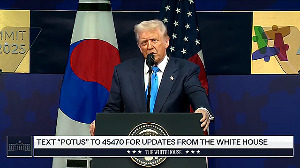A resurgent India will have a prominent place in China's foreign policy calculus when over 2,000 delegates to the 17th National Congress of the ruling Communist Party meet in Beijing from Monday to deliberate on the nation's major policy initiatives for the next five years, party sources said.
While China's foreign policy is not expected to undergo major changes at the 17th Party Congress, party elders are likely to propose new steps to ensure that the policies are in line with the concept of 'harmonious world' enunciated by the top Chinese leadership, including president and Communist Party of China general secretary, Hu Jintao, who is set to be re-elected to the top Party post till 2012.
"There won't be any deviation (from the past) I would say. But certainly there would be some further development," Director General of the International Department of the Central Committee of the CPC, Ai Ping, said.
"Last year, Chinese leaders put forward the concept of a harmonious world and we are making efforts in this aspect. First we have to build Asia as a harmonious region. In this, China's relation with India is very important," Ai told PTI in an interview.
While the congress is not expected to deal with concrete policy to any particular country, it will lay out the general strategic ideas that would become the guiding policies for the party and the government for the next five years up to 2012.
"In that sense, it will affect China's relations with India, in a positive way, I am sure," Ai said, ahead of the National Congress of the CPC, held once in five years.
Ai also noted that China and the CPC are looking forward to the planned visits to Beijing by Congress president and United Progressive Alliance chairperson, Sonia Gandhi, as well as by Prime Minister Manmohan Singh, which would consolidate Sino-India strategic cooperative relations.
Meanwhile, Chinese scholars and veteran diplomats noted that the CPC National Congress is bound to take notice of India's rise.
Since the 16th National Congress of the CPC held in 2002, India has made important all-round progress and consolidated its national strength, they observed.
The simultaneous rise of China and India has no parallel in human history and further developing the Sino-India relations and improving mutual trust are of utmost importance to regional peace, security and development, they said.
They said that China is working towards building a 'harmonious world' that features political mutual trust and co-existence, mutual economic benefit, mutual security and mutual cultural enrichment.
They noted that China and India are neighbours and custodians of two ancient and still thriving civilisations.
India and China are both developing countries and their demographic and socio-economic profile has led both to face similar if not identical problems like unemployment, rural-urban inequalities, regional imbalances, environmental and water problems, deficiencies in the health and educational sectors, cost of energy and many other such issues.
There are a number of global issues, which cannot be resolved unless China and India participate. For example, the issue of environmental degradation, climate change, poverty alleviation and secured sources of energy are areas where unless China and India are part of the dialogue it is very difficult to see how these problems can be dealt with credibly, they said.





